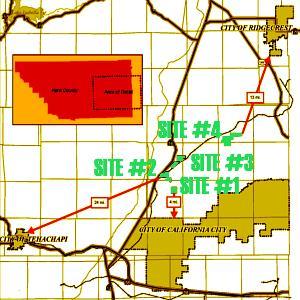CALIFORNIA CITY – City officials at Tuesday’s council meeting agreed to join other area agencies in asking the Kern County Planning Commission to postpone its approval of an environmental report for a solar power project that includes water banking and groundwater removal.
Many in the region fear the proposed Fremont Valley Preservation Water Bank and Solar Project by AquaHelio Resources will adversely impact groundwater levels for area residents and agencies.

Map of eastern Kern County showing proposed sites for the Fremont Valley Preservation Project in proximity to the cities of California City, Ridgecrest and Tehachapi
Weil said that California City has not objected to the solar or water banking project, but have noted concerns regarding the “sell of native ground water to those outside the basin (which) does propose some serious concern that could have a definite impact on future generations.”
According to Weil, the project is currently undergoing review of its Environmental Impact Report by the Kern County Planning Commission, and if recommended, will move forward for final approval by the Kern County Board of Supervisors.
The EIR is addressing the three different components of the Freemont Valley Preservation Project: the 1,008 megawatt Solar Project, the Water Banking of 220,000 acre feet per year, and the Water Extraction of 114,000 acre feet per year – which is not to exceed one million acre feet (in the sales of native water) over 10 years.
Weil raised objections in his report to the annual extraction of 114,000 acre feet of basin native water “even though the calculated recharge rate is only estimated to be 10,000 acre feet per year,” his report stated.
He stated that the project is given credit for that 10,000 acre feet recharge each year “so that their total extraction would only reflect 104,000 acre feet,” he reported. “This in itself is a conscious effort to eventually lower the basin groundwater.”
Weil also noted that the EIR’s mitigation measures come up short on its precautions to monitor groundwater levels through 100-foot wells “to ensure groundwater level reading would only drop 50 feet below ground surface.”
According to his report, “The only problem with that concept is that California City wells are currently operating at the 380-foot level, and the wells that they are referencing is at the bottom of the basin – so this in itself will have a dramatic effect on our water supply costs to drill deeper along with pump sizing as the water drops even further.”
Kern County Planning staff briefed California City officials regarding the project’s EIR on Dec. 19, 2013, where according to Weil’s report, there was very little the city could do to prevent the project from moving forward.
“We can protest and the board of supervisors may cancel the project, but then this would allow someone else rather than the county to be the reviewer of the EIR along with the sell of the water with no mitigation in place,” Weil said.
* * *
The Ridgecrest City Council at its Dec. 18, 2013 meeting also agreed to send Kern County a letter expressing opposition to the AquaHelio Resources project, noting that Indian Wells Valley Water District and other agencies in the region currently oppose the project.
On behalf of “multiple public and private entities located within the Fremont Valley and Indian Wells Valley groundwater basins,” the letter addresses concerns with the Fremont Valley Preservation Project – specifically the “lack of adequate time that was provided for public review and comment” for the 7,000-page Draft Environmental Impact Report, according to the letter.
“At best, the public review and comment period was 68 days,” Ridgecrest officials noted in their letter. “Although some of the signing entities commented on the draft EIR, we do not feel that the public comment period was adequate to allow an independent and comprehensive review and comment on the draft EIR and the project. It should be noted that previous requests to extend the comment period were rejected by County Staff.”
The letter requests that Kern County officials re-open the public comment period by granting a 60-day continuance to allow for rigorous comment and review of the project and draft EIR.
“We urge the Board of Supervisors to slow down the approval process and allow additional time for independent review and comment on the Draft EIR and the project,” the letter states. “We do not feel this is an unreasonable request in light of the potential impacts associated with the project and the dangerous precedent it sets for the exportation of native groundwater from basins in eastern Kern County.”
The project is proposed for four separate sites totalling 4,806 acres around Cantil, near the junction of Highway 14 and Redrock-Randsburg Road. The pumping of up to 114,000 acre feet of native groundwater from the Fremont Valley groundwater basin per year is water that would be sold to users elsewhere in Kern County.
The project’s Environmental Impact Report can be viewed online at pcd.kerndsa.com/planning.

